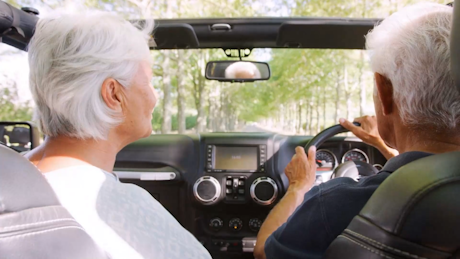How to renew your driving licence if you’re 70 or over
March 01, 2024 by John Rawlings

When you reach the age of 70, your driving licence automatically expires, so if you want to continue driving, you’ll have to renew it (and again every three years). Before doing that, however, you’ll need to think about all the implications of being an older driver.
This guide explains how to renew your driving licence after celebrating your 70th birthday.
How do I renew my driving licence when I turn 70?
Renewing your licence at the age of 70 is a free service that you can access either online or by post.
The DVLA (or DVA in Northern Ireland) will send you a reminder and a D46P application form 90 days before your 70th birthday approaches, then again every three years afterwards when your licence is due for renewal.
If you don’t receive a D46P, contact the DVLA.
How to renew my driving licence online?
If you haven’t used any online DVLA services in the past, you will have to register on the gov.uk website with an email address, your physical address(es) for the last three years, your national insurance (NI) number and a valid UK passport number (if you want to renew the photo on your licence).
If you renew online, it should take around a week to get your new licence.
How to renew my driving licence by post?
You can also apply by post for your new licence, using the D46P application form that DVLA will send you before your 70th birthday. If you haven’t got the D46P form, you can use a D1 application for a driving licence form, which you can pick up at most Post Offices.
If you had a photocard licence before renewal, you’ll need to send a new passport-style photo with your application form. If you had a paper licence, you’ll need to send a current passport photo with your application.
Your new driving licence will probably take three weeks to arrive (longer if your medical or personal details need to be checked).
Can I still drive while the renewal is being processed?
While you’re waiting for your licence to be renewed, you can still drive, assuming you meet certain conditions:
- You’re not currently disqualified from driving
- You had a valid licence before renewal
- Your licence hasn’t been revoked for medical reasons and a doctor says you’re still fit to drive.
How long will the whole process take?
Renewing online means that you should have your new driving licence in about a week. Renewing by post will take about three weeks to get your new driving licence.
Are there any restrictions preventing people over 70 getting a driving licence?
One of the reasons for requiring drivers to renew their licence after the age of 70 is the increased possibility of age-related ailments, so when completing the renewal form, you’ll be asked to declare any medical conditions you have and confirm that you meet driving eyesight standards.
This medical declaration is important, so it’s imperative that you answer all the questions honestly. Not declaring a condition or disability that might affect your driving is an offence for which you can be fined up to £1,000. If you’re involved in a collision and an undeclared medical condition is a contributory factor, you could be prosecuted.
The importance of such a medical declaration is such that it’s worth having a medical check before renewing your licence at 70 and again each time your licence is renewed.
Eyesight is obviously a very important consideration, so to legally drive you must:
- Be able to read a number plate from 20 metres, including with glasses or contact lenses.
- Have a visual acuity of at least decimal 0.5 (6/12) on the Snellen scale, which uses an eye chart.
- Have an adequate field of vision.
An optician can explain these in more detail and carry out the tests.
The gov.uk website includes a full list of medical conditions that require notifications, but some of the major ones include:
- Dementia
- Diabetes that requires insulin treatment
- Parkinson’s disease
- Epilepsy
- Neurological disorders such as multiple sclerosis
- Conditions affecting both eyes, or resulting in total loss of sight in one eye
- Strokes of certain severity
- Cancers of certain severity
You won’t automatically be banned from driving if you have one of these, but the DVLA might ask you to have a medical examination, to assess the severity of the condition. Depending on the results, you could be offered a short-term, one-year licence, or asked to modify your car in some way.
The DVLA might also want to assess your driving ability. This could involve taking a driving assessment course at a local mobility centre, or an RoSPA Experienced Driver Assessment course.















